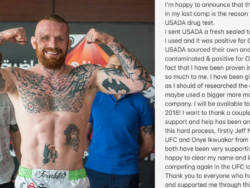The trouble with Ostarine: Jimmy Wallhead’s
16th March 2018
Features


Russia’s National Anti-Doping Plan (NADP), an English version of which was published on 25 May (PDF below) by Russia’s Independent Public Anti-Doping Commission (IPADC), reasserts Russia’s claim that doping was not institutional. ‘It should be noted, however, that the Russian Federation has never had an institutionalised and government-operated system of manipulating the doping control process’, it reads. It also states that the International Paralympic Committee’s (IPC) decision to ban the entire Russian Paralympic team from participating in the Rio 2016 Paralympics was ‘without any factual justification’.
In February, the International Association of Athletics Federations (IAAF) called for an ‘appropriate official response’ to the findings of Richard McLaren in the two Independent Person reports that he produced for the World Anti-Doping Agency (WADA) into Russian doping. In April, the IAAF found Russia to be lacking in providing that appropriate official response, and the above appears to indicate that little has changed.
Last week, the IPC warned that Russia could miss the 2018 Pyeongchang Winter Paralympics unless its reinstatement criteria are met by September. The assertion that the IPC’s ban on the Russian Paralympic Committee (RPC) was unjustified therefore appears to be an odd bit of sabre-rattling.
“According to WADA Director General Olivier Niggli, this document does not always provide sufficient evidence”, read a 25 May speech from Vitaly Smirnov, President of the Russian Olympic Committee, referring to Part 2 of the WADA IP Report. “We also said previously that the McLaren report lacks legal substantiation and scope. Representatives of the IOC and international federations also acknowledge this. At the same time, it is important to note that the report has encouraged us to listen to the commission’s findings, the results of its work. The fact that many Russian athletes were disqualified recently shows that the system that was in place at the time was ineffective in preventing and combatting the use of doping. Preventive mechanisms failed to work and the most unpleasant thing is that ‘clean’ athletes, who have never broken any rules in their life, have suffered as a result.”
Pavel Kolobkov, Russia’s Minister for Sport, pointed to the changes that Russia has already introduced at a 23 May meeting, when the plan was launched. “An Independent Public Anti-Doping Commission has been established”, he said in a statement. “Russia opened its borders to foreign anti-doping officers. Together with WADA, the Russian Anti-Doping Agency is being reformed, its budget has been increased and a direct procedure for its financing directly from the federal budget is envisaged. The Russian anti-doping laboratory has been transferred to MSU [Moscow State University]. Criminal liability has been introduced for inducing an athlete to use dope. All these activities we are carrying out together with the international sports community.”
The plan contains commitments to:
• education and whistleblowers;
• the creation of a Russian database to inform athletes about whether products they are taking contain prohibited substances; and
• possible legislative changes to force manufacturers to indicate when an ingredient is prohibited in sport.
A ‘Unified Anti-Doping Database’ will allow athletes to ‘promptly obtain any reliable and operational information about the presence (if any) in medical preparations registered on the Russian Federation territory, of any substances prohibited by sport regulation’.
The NADP recommends the possibility of requiring manufacturers to label pharmaceuticals and ‘biologically active additives’ that contain prohibited substances with ‘a clearly visible marking, “DOPING”, with an indication of the year in which [the substances] were included on the Prohibited List’, as well as stipulating the penalties applicable to the athlete for violation. In terms of education, the plan proposes making it obligatory for ‘educational institutions to develop refresher course programmes for experts in physical education and sport focussed on the anti-doping campaign in sport’.
The NADP promises to ‘promote the use of whistle-blowers – i.e. persons who will provide timely information about any anti-doping violations by athletes, support personnel, other sport stakeholders and sporting organisations’. However, it does not provide any detail about how this promise will be implemented.
In March, Russian whistleblower Andrey Dmitriev was forced to flee Russia against his will, due to a number of incidents that followed his secret filming of suspended coaches training elite Russian athletes in January. Yulia and Vitaly Stepanov have also spoke about the threat they faced following the December 2014 ARD documentary in which they spoke about systemic Russian doping. Darya Pishchalnikova has also alleged that Russian Deputy Prime Minister, Vitaly Mutko, threatened her with a life ban unless she withdrew allegations that Russian Athletics Federation (RusAF) and laboratory officials were colluding to swap samples in exchange for money.
WADA confirmed it has received and is reviewing the NADP. ‘WADA can confirm that we have received Russia’s National Anti-Doping Strategy and we are currently in the process of reviewing it’, read a statement provided to Russian State news agency TASS.
• Eleven athletes (and a horse trainer) from eleven countries, competing in nine sports, were...
• 20 athletes from nine countries, competing in ten sports, were involved in anti-doping proceedings...
• Twenty four athletes from 13 countries, competing in eight sports, were involved in anti-doping...